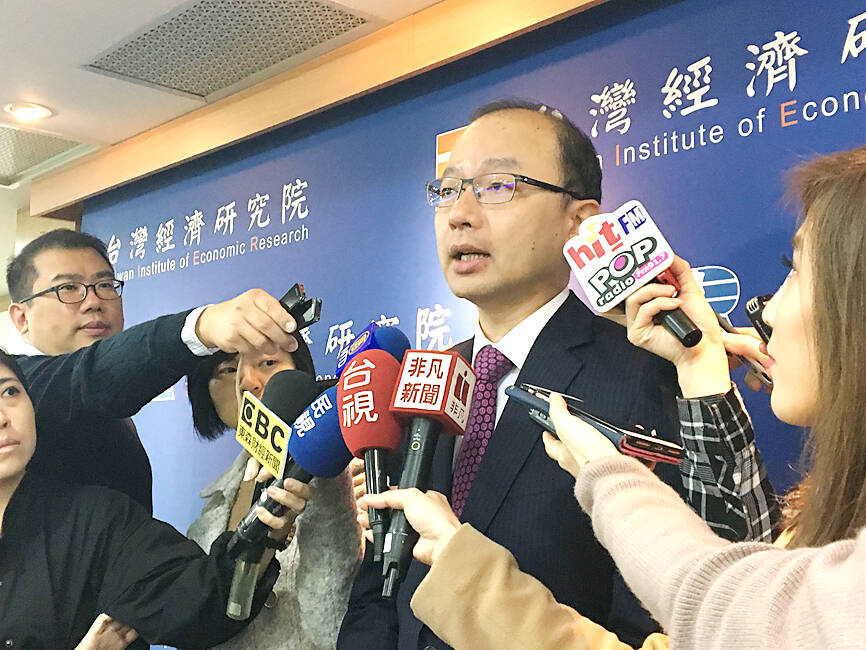The Taiwan Institute of Economic Research (TIER, 台灣經濟研究院) yesterday cut its forecast for the nation’s GDP growth this year by 0.27 percentage points to 2.31 percent, as exports and private investment fare weaker than expected amid a global economic slowdown.
The projection made the Taipei-based think tank the most optimistic among local research bodies as it believes the domestic front would hold firm with support from the government.
Exports, the key growth driver that accounts for about 60 percent of GDP, shrank by double-percentage points in the first quarter and would not come out of the woods until the fourth quarter, meriting a downward growth revision, TIER Economic Forecasting Center director Gordon Sun (孫明德) told an online news conference.

Photo: CNA
Exports would contract 7.08 percent this year, while imports would decline 9.18 percent, Sun said.
The institute previously forecast that outbound and inbound shipments would advance.
The pain induced by major central banks’ drastic interest rate hikes would grow more evident this year, sapping global demand for goods and services, he said.
Taiwanese exporters, especially electronics suppliers, have been hit hard, with many reporting disappointing first-quarter results, Sun said, adding that a meaningful recovery hinges on inventory adjustments, which would take longer than expected.
The backdrop is unfavorable for fixed capital formation and private investment, with the former forecast to squeeze in a tiny 0.42 percent growth while the latter would fall 0.32 percent, as businesses turn cautious about capital spending, the institute said.
The government and public enterprises would lend support by increasing their investment and expenditure to bolster overall domestic demand, Sun said.
The institute is sticking to its forecast growth of 5.95 percent for private consumption, the mainstay of GDP growth this year, Sun said.
TIER is less pessimistic compared with other institutes, because it has tracked business confidence for different sectors and discerned a sentiment pickup for several straight months.
The sentiment gauge for the manufacturing industry last month gained 2.24 points for the fifth month to 93.95, although companies with positive views decreased to 26.1 percent and more companies turned conservative, it said.
The confidence reading for service providers rose 1.52 points to 96.75, the strongest since August last year, it said.
Interest rate hikes have benefited the wealth management business and credit card charges received a boost from rising overseas travel, it said.
The sentiment value for construction companies and real-estate brokers dropped 2.02 points to 91.25, as pricing differences continued to slow transactions, it said.

Intel Corp chief executive officer Lip-Bu Tan (陳立武) is expected to meet with Taiwanese suppliers next month in conjunction with the opening of the Computex Taipei trade show, supply chain sources said on Monday. The visit, the first for Tan to Taiwan since assuming his new post last month, would be aimed at enhancing Intel’s ties with suppliers in Taiwan as he attempts to help turn around the struggling US chipmaker, the sources said. Tan is to hold a banquet to celebrate Intel’s 40-year presence in Taiwan before Computex opens on May 20 and invite dozens of Taiwanese suppliers to exchange views

Application-specific integrated circuit designer Faraday Technology Corp (智原) yesterday said that although revenue this quarter would decline 30 percent from last quarter, it retained its full-year forecast of revenue growth of 100 percent. The company attributed the quarterly drop to a slowdown in customers’ production of chips using Faraday’s advanced packaging technology. The company is still confident about its revenue growth this year, given its strong “design-win” — or the projects it won to help customers design their chips, Faraday president Steve Wang (王國雍) told an online earnings conference. “The design-win this year is better than we expected. We believe we will win

Chizuko Kimura has become the first female sushi chef in the world to win a Michelin star, fulfilling a promise she made to her dying husband to continue his legacy. The 54-year-old Japanese chef regained the Michelin star her late husband, Shunei Kimura, won three years ago for their Sushi Shunei restaurant in Paris. For Shunei Kimura, the star was a dream come true. However, the joy was short-lived. He died from cancer just three months later in June 2022. He was 65. The following year, the restaurant in the heart of Montmartre lost its star rating. Chizuko Kimura insisted that the new star is still down

While China’s leaders use their economic and political might to fight US President Donald Trump’s trade war “to the end,” its army of social media soldiers are embarking on a more humorous campaign online. Trump’s tariff blitz has seen Washington and Beijing impose eye-watering duties on imports from the other, fanning a standoff between the economic superpowers that has sparked global recession fears and sent markets into a tailspin. Trump says his policy is a response to years of being “ripped off” by other countries and aims to bring manufacturing to the US, forcing companies to employ US workers. However, China’s online warriors